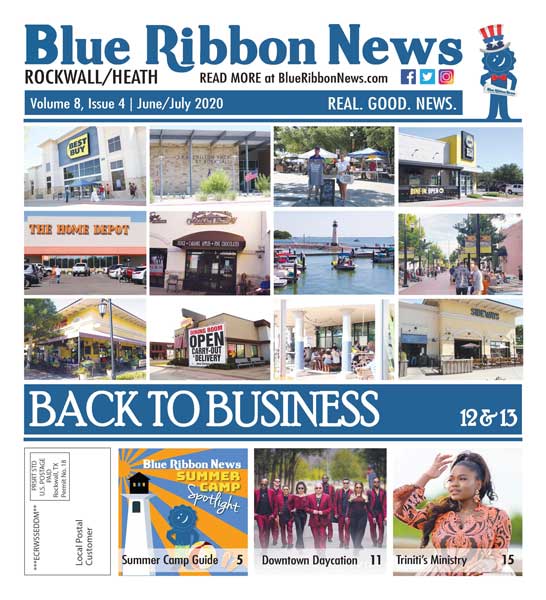
ROCKWALL, TX – August 6, 2020 — COVID-19 has impacted and rearranged all of our lives. Of necessity, we spend more time together, often living in close quarters. During this unusual time, how we relate to each other, how we give and receive love, and the quality of that love, is very important for our health and well-being.
Recently I went to an eye doctor. While there, a staff member who was attending to me discovered I was a marriage and family therapist. This piqued her interest, and she promptly inquired “What is the secret of a good relationship? Do you have any tips?” In fact, after 30 years in the business of helping couples heal and grow in relationship, I replied, “Yes, I do.”
As I started to enumerate some of what I had learned personally and professionally over the years, the staff member said, “Wait, wait. I want to write all this down.” As she was carefully recording my comments, the wonderful doctor in charge, who values her services, glanced in through the door. Her experience told her that behind the glance was a message that she was lingering a little too long. After he returned with a second glance, the staff member abruptly moved on, leaving our unfinished conversation. No time for chit chat in this very busy office.
The outcome of this shortened conversation was an inspiration for me to put my thoughts in writing. So, you might say, both the staff member and the doctor, prompted the writing of this article. While there are numerous thoughts on the subject, here are 10 steps, known to work, to create good and deeply loving relationships:
1) EMOTIONAL SAFETY
Diligently focus on creating an emotionally safe environment for the relationship to grow in. This is primary. Emotional safety enables you to truly be yourself and to show up in a relationship. Otherwise you live, for the most part, in a survival mode, never free to be yourself. The tips that follow all contribute to increasing emotional safety in a relationship.
2) GRATITUDE/APPRECIATION
Express appreciation and gratitude every day to your loved ones and those who are significant in your life. Research shows that gratitude is one of the fastest ways to transform a relationship and bring it to a new level. It stimulates positive chemicals in your brain as well as in the brain of the receiver.
3) DELETE NEGATIVITY
Notice how quickly transformation takes place when you adopt the message of Jon Kabat-Zen, “Write yourself a restraining order against self-criticism and criticism of others.” When you ask something of someone, make sure there is no negativity or implication of ‘wrongness’ in the request. For example, ‘wrongness’ is implied when you say, “You never think to take the garbage out.” Such a message is letting the person know how wrong and deficient he or she is. Positive words that would get the same message across, maintaining the connection might be, “Something I really appreciate, is when you remember to take the garbage out. It makes my day!”
4) CHOOSE YOUR WORDS AND TONE OF VOICE
The words you use and the tone of your voice are some of the most powerful connectors on the planet as well as powerful disconnectors. Your words, as well as your tone of voice, have the power to foster connection, inspire, encourage, uplift and validate. Your words, and tone of voice, can also extinguish a mountain of joy, diminish hope, destroy with toxic criticism, and leave others feeling shamed, blamed, and not good enough. Your words have the power to breathe life into someone or take someone’s light away.
5) COMMUNICATION SKILLS
Three simple skills that foster the connection of a relationship are mirroring, validation and empathy. These skills make an enormous difference for relationships. Example: your partner says, “As soon as it is safe to travel, I want to take off for a long vacation.” MIRRORING (reflecting back): “So when we get beyond Covid-19, you would love to travel and take a long vacation.” VALIDATION: “That makes sense, after being cooped up for so long.” (Validation does not mean you agree with what was said, only that it makes sense for the person who thinks it.) EMPATHY (acknowledging the feelings): ” I imagine a vacation like that might make you feel really excited, very free and happy. Did I get that right?” In contrast to this, imagine how a person might feel getting this response, “Just forget it. We don’t have that kind of money.” For further information on communication skills, see: SafeConversation.com.
6) BOUNDARIES
Good boundaries are important for any relationship. Imagine two people standing in hula hoops. Each one is an authority in his/her own space. Problems occur when someone acts like an authority in someone else’s space. When they speak or intrude they often use “You statements” which are almost always boundary violations. “You always feel…,” “You think…;” “You never (always)…” In contrast, “I” statements keep you safely in your own space. “I felt disappointed when…”
7) OWNERSHIP OF FEELINGS AND SELF-LOVE
When two people are having problems communicating with each other you will inevitably see what is known as the “Projection/Personalizing Dance.” Neither one is taking ownership for his/her feelings. This dance, if not transcended, is a frequent destroyer of a potentially good relationship. The Projector often resorts to anger. When this happens, the feelings that come up in his/her “well” are not owned, they are missiled over to someone else. You will hear projected remarks like, “You made me feel unimportant.” “You made me feel embarrassed.” In reality, all the partner can ever do is trigger, or bring up, the feelings already in the person’s “well.” The partner does not cause them. The feelings of unimportance, shame, guilt, inferiority, rejection, have to already be in the Projector’s “well” or these feelings will not come up, no matter what the partner says. Think of the metaphor of a bullet without powder in it. No matter how hard you pull the trigger, the gun will not go off. Eleanor Roosevelt said it best, “No one can make you feel inferior, unless you consent to it.”
To break projection in relationship, it is very helpful to start conversations with, “I know these feelings are more about me than you, but it would really help me if I could process them with you.” Notice the different response you get from your partner, or other person, when you take ownership for your feelings. The person you are conversing with will be more relaxed and listen better because they know you are not going dump what is not theirs onto them.
The Personalizer, on the other hand, often feels pain, hurt, or not important. This happens because the Personalizer takes what the Projector, or sender says, or their behaviors, and makes it say something about them. Because the personalizer lacks good boundaries, pain, hurt and rejection are frequent companions. In good relationships, it is understood that feelings always say more about the one having them. Personalizers are like a sponge, taking in everybody else’s feelings and behaviors, making these feelings and behaviors say something about them. They take in what is not theirs to own.
Some years ago, I encountered a woman who was feeling hurt and in deep pain because she discovered that her distinguished husband had been acting out his sexual addiction for years. Subsequently she spent a month at a well-known treatment center to help her cope. When I met her again, some months later, she looked very different, happy and feeling good about herself. When I inquired about the transformation her response was that she had developed a new awareness, namely, that his behaviors were not about her. And, that his acting out said nothing about who she was. Once she stopped personalizing his “stuff,” making it about her, she became her beautiful self once again.
Developing a healthy self-love is related to taking ownership for your feelings. It is critical for two reasons. First, it is well-known that our capacity to love others and for others to love us, is directly related to our capacity to love ourselves. Secondly, when we are filled with self-loathing, shame, feelings of anger, self-rejection, toxic self-criticism , feeling not good enough, these negative feelings get projected onto others and then we blame others and make them responsible for the way we feel. When we carry these negative feelings around in us we often criticize and attack others until unconsciously we get them to respond to us the way we are feeling about ourselves.
8) LAUGHTER
Good relationships are joyous and fun-filled and lightened by laughter. Laughter releases the whole body, boosts the immune system, triggers the release of endorphins, protects the heart, diffuses conflict and attracts others to you as well as much more. Consciously engage in behaviors that increase humor and laughter. Play a game of Scattergories, share some jokes from online, tap into a laughing yoga class, watch a funny movie, or just stand and face each other and have a good belly laugh.
9) BE INTENTIONAL
The brilliant cell biologist, Dr. Bruce Lipton, teaches us how powerful thoughts are either for improving the immune system or for diminishing the immune system. For a deeper understanding of the power of intentions, thoughts, and beliefs listen to his life-changing talk on “What You Think You Become.” https://www.youtube.com/watch?v=GiBDm7Za-2U
His research will encourage you to be much more conscious about what you are putting into your body and make you aware of the impact you are having on your health. Being in good health contributes to a good relationship. Know that when you worry you are energizing what you don’t want in your life, so don’t be surprised if you get it. Consciously energizing and being intentional about what you do want in your life and in your relationship make a profound difference in outcome. Create your own story. Choose love over fear.
10) MEDITATION
One of the best ways to create more peace, joy and serenity in a relationship is to engage in the practice of meditation. When deeply relaxed, the nervous system becomes calm, releasing damaging stress. Meditation takes the couple relationship to a more conscious level. Harmony, emotional balance, and a deepening of the relationship occur. To help those in a significant relationship achieve this, my husband, Dr. David McKeon and I, have produced a set of meditations. These meditations may be downloaded for free from any of the music outlets like Spotify, Pandora, Apple music. To access these meditations type in Thriving in Relationship: 21-Day Meditations for Couples.
In closing, a good relationship will certainly sprout if we choose to live out the powerful words of the beloved Congressman John R. Lewis , “… walk with the wind … and let the spirit of peace and the power of everlasting love be your guide.”
 By Dr. Margie McKeon. Dr. McKeon is a long time resident of Rockwall. Along with her husband, Dr. David McKeon, she earned her doctoral degree in Counseling with an emphasis in Marriage and Family Therapy from Texas A & M, Commerce, TX. The McKeons have been serving the Rockwall community and surrounding areas as licensed Marriage and Family therapists for over 30 years. Together they produced 21-Day Mediations for Couples. Dr. Margie McKeon has also published “Love Is All There Is,” a complication of inspiring quotes to encourage readers to develop healthy self-love essential for a good relationship.
By Dr. Margie McKeon. Dr. McKeon is a long time resident of Rockwall. Along with her husband, Dr. David McKeon, she earned her doctoral degree in Counseling with an emphasis in Marriage and Family Therapy from Texas A & M, Commerce, TX. The McKeons have been serving the Rockwall community and surrounding areas as licensed Marriage and Family therapists for over 30 years. Together they produced 21-Day Mediations for Couples. Dr. Margie McKeon has also published “Love Is All There Is,” a complication of inspiring quotes to encourage readers to develop healthy self-love essential for a good relationship.
 Our print edition is delivered free to ~15,500 homes in Rockwall and Heath, TX.
Our print edition is delivered free to ~15,500 homes in Rockwall and Heath, TX.
To share your good news and events, email editor@BlueRibbonNews.com.
Subscribe to our email newsletter here.
Advertising: 214-342-8000 or advertising@BlueRibbonNews.com.
"love" - Google News
August 07, 2020 at 02:19AM
https://ift.tt/31pjhkd
Love is Never Quarantined: 10 Steps for Developing Loving Relationships - Blue Ribbon News
"love" - Google News
https://ift.tt/39HfQIT
Shoes Man Tutorial
Pos News Update
Meme Update
Korean Entertainment News
Japan News Update
Bagikan Berita Ini















0 Response to "Love is Never Quarantined: 10 Steps for Developing Loving Relationships - Blue Ribbon News"
Post a Comment